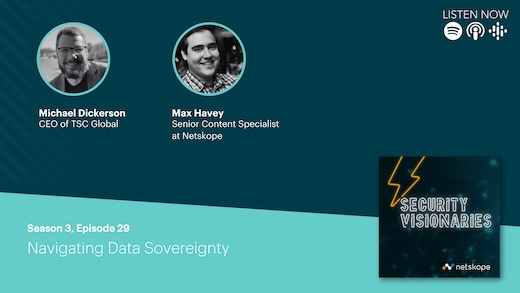Co-authored by Joe DePalo and Jason Clark
You’ve probably heard at one point or another the cliché that the internet is broken. It’s no secret that the underlying infrastructure that businesses around the world use to access cloud applications and data is flawed and wasn’t built with today’s scale in mind. That puts IT security leaders in a tough position because there’s a penalty for deploying security tools, in the form of increased latency. Traffic is backhauled for inspection, which slows down workflows and creates issues for all executives who sit outside of the security organization. The trade-off many businesses unfortunately make is to bury their heads in the sand and choose performance over security, which results in their sensitive data leaking out of the organization like water through a sieve.
A big part of the problem is that the internet was never designed to be a secure network in the first place. When Department of Defense officials laid the groundwork for ARPANET, the internet’s precursor, they envisioned it as a way to link up a relatively small number of government and academic research centers. They didn’t expect that criminals, nation-states, or activist hackers would eventually try to steal information sent through the pipes. So even though security wasn’t baked into the system, the internet continued to grow — from big, centralized computers at universities to your laptop, smartphone, and a connected thermostat.
Infrastructural Flaws and Challenges to Change
Why have companies accepted a system not suited to their needs? One reason is that it’s convenient. Some businesses are more than willing to discount the risk of cyberattacks in favor of less friction for users if there isn’t an obvious alternative. Others, like the financial services or defense sector, are more regulated and have a “security-first” mindset and end up backhauling traffic at the expense of the user experience.
Another reason is that vendors, for years, have told companies that these security and user experience tradeoffs are just baked into the rules. They can offer you better tires and new brakes (hardware refresh time!), but they can’t change the fact that you’re driving in an outdated car. And because they’ve built and promoted this broken system, they have little incentive to replace it with something new that will end up cannibalizing the solutions they’ve been hyping for years.
By now, the internet has been woven into every aspect of our cultural and economic life. It’s used by businesses around the globe — yours included — to access everything from mission-critical applications to blog posts. It probably seems unthinkable to rip it up and replace it with something new. But there is a better solution out there in the form of a distributed network architecture that doesn’t force companies to choose between speed and security. Think of it as relying on a dedicated version of the internet that allows you to keep hackers away and your data secure, while allowing you to maintain a fast round-trip time that your employees and customers require. To take the car analogy a little further, instead of making small tweaks here and there to your beater, you can sub out the whole vehicle for a Formula 1 race car. Instead of accepting that we have to operate on a crummy playing field, it needs to be changed out entirely.
In the coming years, security teams will either switch to this new model or get left behind, because few will want to keep pitting speed against security when they need to have both.
One challenge, of course, is that it wouldn’t make sense for individual companies to build out their own private, carrier-grade networks. And in today’s ecosystem, network operators have little reason to provide such an alternative. The carrier that provides you internet access doesn’t make more money if you use their services more often. In fact, they actually lose money if you and everyone else are constantly downloading large files and streaming videos because it blows up their cost models. In essence, they have no incentive to build out their infrastructure to anything more than the bare minimum.
Cloud providers, on the other hand, have an incentive to make their internal networks run smoothly, but they don’t have a reason to make it easy for customers to get in and out fast. Think of them like casinos — they make the most money when people don’t leave, so they hide the exits. If cloud providers had fast performant access in and out of their networks it would allow customers to use multiple cloud providers, or even use customer-owned data centers. Cloud providers do not want that! They are very content with you leaving all your work in the cloud. The result for businesses is unworkable round-trip delays and that get worse the further you are from the core of their networks
To sum it up, the carriers and cloud providers have no motivation to solve the performance vs. security trade-off dilemma that all enterprises face with today’s internet because they know it’s too expensive and difficult for them to build their own interconnected environment.
How Netskope is Solving the Problem
The gap is obvious, but until now no one had the incentive to fill the void. At Netskope, we believe it’s time for security innovators to step in. With the explosion of shadow IT and applications that can be directly accessed by employees and customers, security is becoming a leading force in the evolution of the internet and how companies stay connected.
So we’ve decided to take control of our own destiny and build out our own private infrastructure; one where we can implement strong security controls while at the same time be able to touch every IP address in the world in 50 milliseconds or less. We’ve brought together the best minds in security and networking to build this next generation of Netskope infrastructure, which we call Netskope NewEdge. Our goal is ambitious: to maintain quick, reliable connectivity to every region in the world without compromising security. But the internet can’t offer this, and we believe it’s time for this networking and security evolution. In the same way that Netflix outgrew mailed DVD deliveries and invested in building its own streaming platform, and Amazon outgrew its underlying infrastructure and built AWS, we feel it’s time to take matters into our own hands.
The alternative just isn’t acceptable anymore. When companies rely on the internet to access and transfer sensitive data, they’re essentially driving blind. Customers typically have around 1,200 SaaS apps, and only a tiny fraction get adequate attention from security teams. Imagine if your HR department uploads all your employees’ salary, age, and address information into a pay analysis app that might in turn be run by 10 people with no security expertise. No one is checking if the data should be leaving or if the app should be trusted. If you try to add visibility, it ends up adding more friction to the user experience, which isn’t good for business.
Why Mindsets Need to Change Now
The stakes are likely higher than ever right now. Netskope Threat Labs has been monitoring how organizations and employees have dramatically shifted to remote work since the start of the coronavirus outbreak. About two-thirds of users in North America are now working from home, compared to about 27% of users prior to the outbreak. That shift significantly increases the attack surface which has been the hardest to protect, which in turn, leads to more breaches. Instead of routing all communications through your data center, where you’ve painstakingly invested thousands to millions of dollars and countless hours building your security stack into, your employees are going directly to the internet. Why? Because that’s how they’re getting to what they need — the cloud applications that don’t need your network to work and aren’t managed by your IT department. And because they are so accessible, users can connect to them directly whether they’re on a company managed device or not. There needs to be a way for workers to quickly access the information they need without opening the door to cybercriminals.
Perhaps the best way to illustrate the power of this new approach is with a scenario that by now is all too familiar. Let’s say you’re a security leader for a large healthcare firm. It’s your job to keep sensitive medical information secure, harden complex medical devices against hackers, and protect all the other valuable corporate and employee data flowing through the organization every second. Your team has been eyeing a new security tool that will improve the visibility of your data, making your life easier and the organization’s critical data safer. But when you pitch the solution to the CIO, it gets struck down because implementing it would increase latency for users. If you’ve been in security long enough, you’re probably more than familiar with this battle. In the competition of speed vs. security, security often loses out.
But what if we told you that there doesn’t need to be a trade-off in the first place? You can deploy that new tool without putting employees, customers, or critical business data at risk. If you switch to a distributed network architecture like Netskope NewEdge, the CIO’s go-to argument is essentially negated. Instead of having to go through the tedious process of analyzing the risk and quantifying whether the new security tool is worth the cost compared to losing speed, you’re now looking at a whole new type of calculation. You can deploy whatever security solution your organization needs while still keeping round-trip time under 50 milliseconds — and that’s to any IP address, no matter how remote it may be, because we’ve built out these high-capacity points of presence around the globe.
As veterans in the security and networking worlds, we’re not just excited about how this new framework will help protect businesses and their data — we also know that it will make your life as a cybersecurity leader easier. Security can feel like a thankless job sometimes. Even if you win the speed vs. security battle, you end up getting blamed for slowing things down and making your colleagues’ jobs harder. It’s no wonder that security has become an afterthought for CEOs and other senior business leaders. Maybe they’d rather ignore the problem if it means they can avoid operational roadblocks. But in this new paradigm that we’ve explained, security leaders can now be the heroes. If they become advocates for this new approach, they’ll be the ones who get the credit for strengthening both speed and security. If not, they risk getting left behind.
About the Authors:
Joe DePalo leads the platform engineering organization at Netskope and is responsible for the design, build, and operations of the current and future generations of the Netskope infrastructure and platform. Prior to joining Netskope, Joe was the global head of internet services for Amazon Web Services (AWS), where he was responsible for the AWS Global Network and the Amazon carrier strategy. Prior to AWS, he was SVP of operations and engineering at Limelight Networks. There, he and his team built the second-largest content delivery network in the world.
Jason Clark brings decades of experience executing successful strategic security programs and business strategies to Netskope as Chief Strategy and Marketing Officer. Responsible for corporate strategy, marketing, and cybersecurity, previously Clark was CSO for Optiv, where he helped the company grow from $500 million to $2 billion in under 3 years while running the transition from a value-added reseller to a cybersecurity systems integrator. Prior to Optiv, Clark held a leadership role at Websense, where he was a driving force behind the company’s transformation into a provider of critical technology for chief information security officers (CISOs) to become Forcepoint/Raytheon.




 Voltar
Voltar 






















 Leia o Blog
Leia o Blog